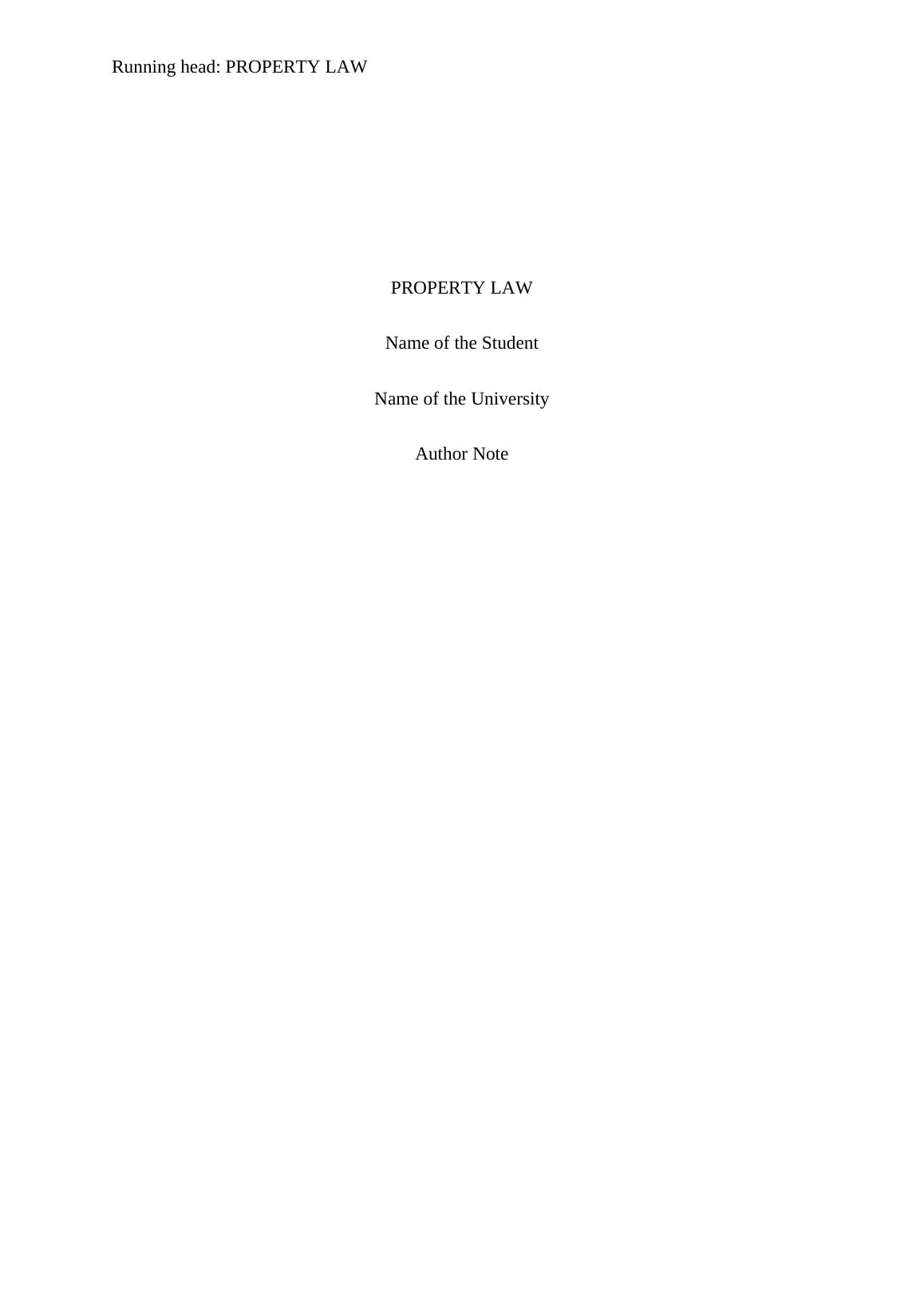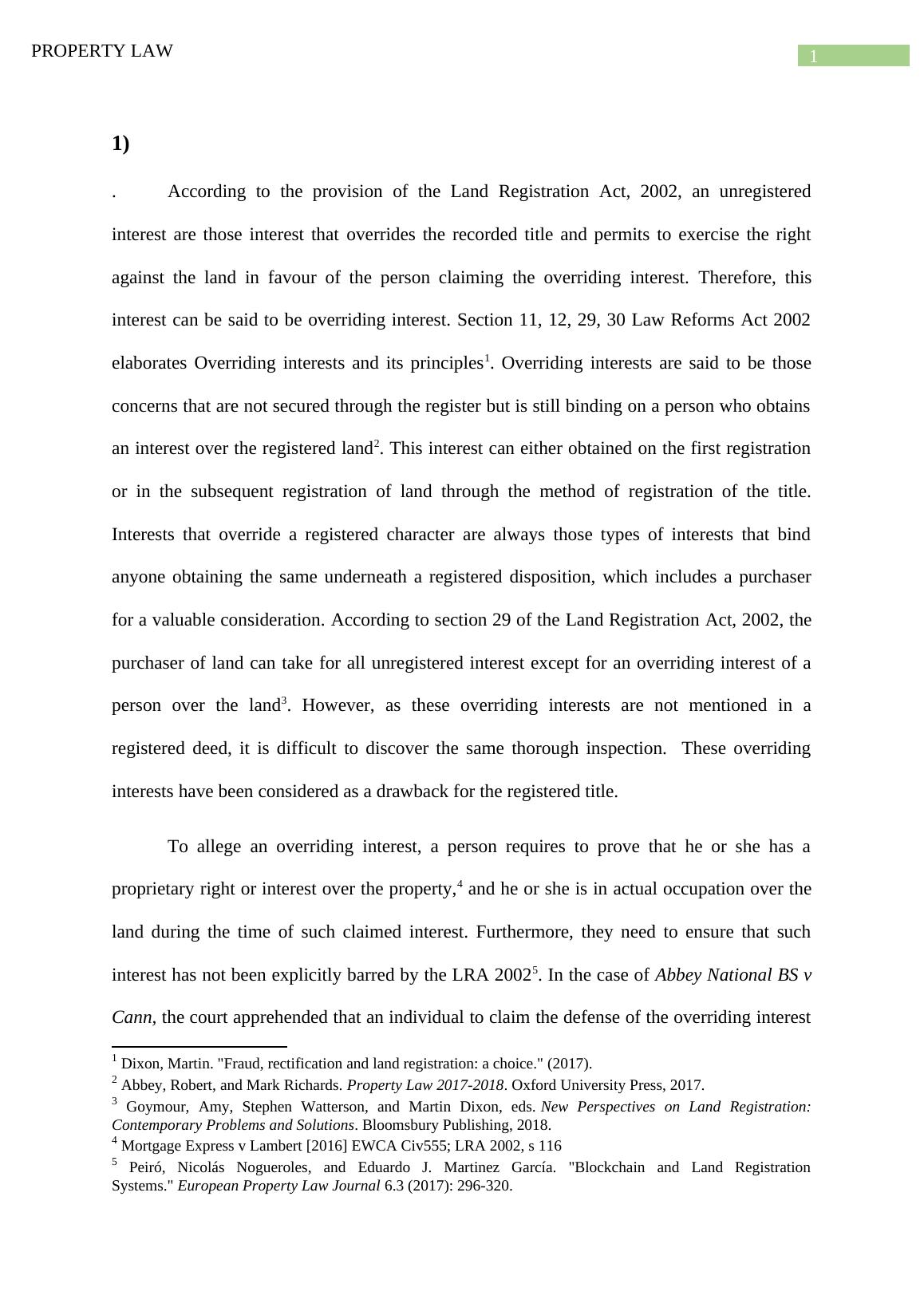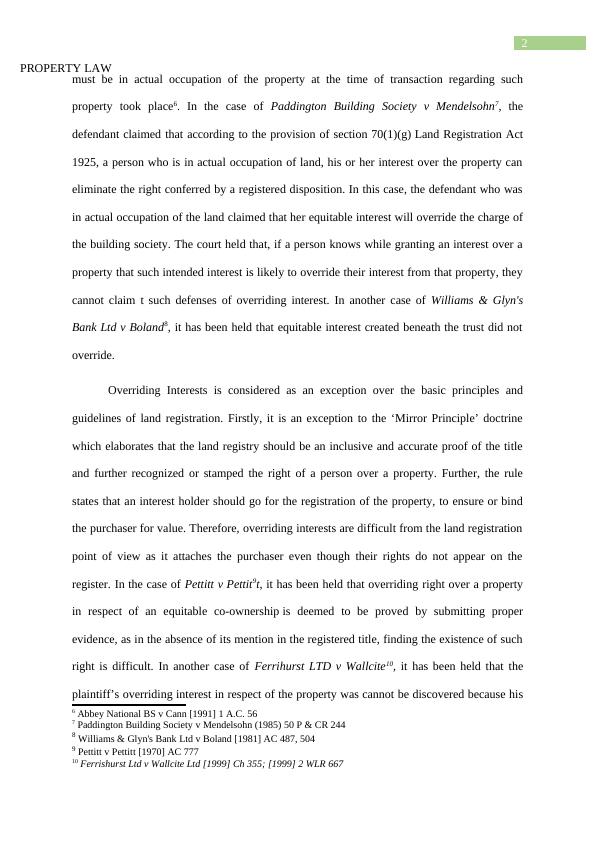Land Registration Act, 2002 | Property Law
Brief introduction to ‘Overriding Interests’
9 Pages2342 Words62 Views
Added on 2022-08-24
Land Registration Act, 2002 | Property Law
Brief introduction to ‘Overriding Interests’
Added on 2022-08-24
ShareRelated Documents
Running head: PROPERTY LAW
PROPERTY LAW
Name of the Student
Name of the University
Author Note
PROPERTY LAW
Name of the Student
Name of the University
Author Note

1
PROPERTY LAW
1)
. According to the provision of the Land Registration Act, 2002, an unregistered
interest are those interest that overrides the recorded title and permits to exercise the right
against the land in favour of the person claiming the overriding interest. Therefore, this
interest can be said to be overriding interest. Section 11, 12, 29, 30 Law Reforms Act 2002
elaborates Overriding interests and its principles1. Overriding interests are said to be those
concerns that are not secured through the register but is still binding on a person who obtains
an interest over the registered land2. This interest can either obtained on the first registration
or in the subsequent registration of land through the method of registration of the title.
Interests that override a registered character are always those types of interests that bind
anyone obtaining the same underneath a registered disposition, which includes a purchaser
for a valuable consideration. According to section 29 of the Land Registration Act, 2002, the
purchaser of land can take for all unregistered interest except for an overriding interest of a
person over the land3. However, as these overriding interests are not mentioned in a
registered deed, it is difficult to discover the same thorough inspection. These overriding
interests have been considered as a drawback for the registered title.
To allege an overriding interest, a person requires to prove that he or she has a
proprietary right or interest over the property,4 and he or she is in actual occupation over the
land during the time of such claimed interest. Furthermore, they need to ensure that such
interest has not been explicitly barred by the LRA 20025. In the case of Abbey National BS v
Cann, the court apprehended that an individual to claim the defense of the overriding interest
1 Dixon, Martin. "Fraud, rectification and land registration: a choice." (2017).
2 Abbey, Robert, and Mark Richards. Property Law 2017-2018. Oxford University Press, 2017.
3 Goymour, Amy, Stephen Watterson, and Martin Dixon, eds. New Perspectives on Land Registration:
Contemporary Problems and Solutions. Bloomsbury Publishing, 2018.
4 Mortgage Express v Lambert [2016] EWCA Civ555; LRA 2002, s 116
5 Peiró, Nicolás Nogueroles, and Eduardo J. Martinez García. "Blockchain and Land Registration
Systems." European Property Law Journal 6.3 (2017): 296-320.
PROPERTY LAW
1)
. According to the provision of the Land Registration Act, 2002, an unregistered
interest are those interest that overrides the recorded title and permits to exercise the right
against the land in favour of the person claiming the overriding interest. Therefore, this
interest can be said to be overriding interest. Section 11, 12, 29, 30 Law Reforms Act 2002
elaborates Overriding interests and its principles1. Overriding interests are said to be those
concerns that are not secured through the register but is still binding on a person who obtains
an interest over the registered land2. This interest can either obtained on the first registration
or in the subsequent registration of land through the method of registration of the title.
Interests that override a registered character are always those types of interests that bind
anyone obtaining the same underneath a registered disposition, which includes a purchaser
for a valuable consideration. According to section 29 of the Land Registration Act, 2002, the
purchaser of land can take for all unregistered interest except for an overriding interest of a
person over the land3. However, as these overriding interests are not mentioned in a
registered deed, it is difficult to discover the same thorough inspection. These overriding
interests have been considered as a drawback for the registered title.
To allege an overriding interest, a person requires to prove that he or she has a
proprietary right or interest over the property,4 and he or she is in actual occupation over the
land during the time of such claimed interest. Furthermore, they need to ensure that such
interest has not been explicitly barred by the LRA 20025. In the case of Abbey National BS v
Cann, the court apprehended that an individual to claim the defense of the overriding interest
1 Dixon, Martin. "Fraud, rectification and land registration: a choice." (2017).
2 Abbey, Robert, and Mark Richards. Property Law 2017-2018. Oxford University Press, 2017.
3 Goymour, Amy, Stephen Watterson, and Martin Dixon, eds. New Perspectives on Land Registration:
Contemporary Problems and Solutions. Bloomsbury Publishing, 2018.
4 Mortgage Express v Lambert [2016] EWCA Civ555; LRA 2002, s 116
5 Peiró, Nicolás Nogueroles, and Eduardo J. Martinez García. "Blockchain and Land Registration
Systems." European Property Law Journal 6.3 (2017): 296-320.

2
PROPERTY LAW
must be in actual occupation of the property at the time of transaction regarding such
property took place6. In the case of Paddington Building Society v Mendelsohn7, the
defendant claimed that according to the provision of section 70(1)(g) Land Registration Act
1925, a person who is in actual occupation of land, his or her interest over the property can
eliminate the right conferred by a registered disposition. In this case, the defendant who was
in actual occupation of the land claimed that her equitable interest will override the charge of
the building society. The court held that, if a person knows while granting an interest over a
property that such intended interest is likely to override their interest from that property, they
cannot claim t such defenses of overriding interest. In another case of Williams & Glyn's
Bank Ltd v Boland8, it has been held that equitable interest created beneath the trust did not
override.
Overriding Interests is considered as an exception over the basic principles and
guidelines of land registration. Firstly, it is an exception to the ‘Mirror Principle’ doctrine
which elaborates that the land registry should be an inclusive and accurate proof of the title
and further recognized or stamped the right of a person over a property. Further, the rule
states that an interest holder should go for the registration of the property, to ensure or bind
the purchaser for value. Therefore, overriding interests are difficult from the land registration
point of view as it attaches the purchaser even though their rights do not appear on the
register. In the case of Pettitt v Pettit9t, it has been held that overriding right over a property
in respect of an equitable co-ownership is deemed to be proved by submitting proper
evidence, as in the absence of its mention in the registered title, finding the existence of such
right is difficult. In another case of Ferrihurst LTD v Wallcite10, it has been held that the
plaintiff’s overriding interest in respect of the property was cannot be discovered because his
6 Abbey National BS v Cann [1991] 1 A.C. 56
7 Paddington Building Society v Mendelsohn (1985) 50 P & CR 244
8 Williams & Glyn's Bank Ltd v Boland [1981] AC 487, 504
9 Pettitt v Pettitt [1970] AC 777
10 Ferrishurst Ltd v Wallcite Ltd [1999] Ch 355; [1999] 2 WLR 667
PROPERTY LAW
must be in actual occupation of the property at the time of transaction regarding such
property took place6. In the case of Paddington Building Society v Mendelsohn7, the
defendant claimed that according to the provision of section 70(1)(g) Land Registration Act
1925, a person who is in actual occupation of land, his or her interest over the property can
eliminate the right conferred by a registered disposition. In this case, the defendant who was
in actual occupation of the land claimed that her equitable interest will override the charge of
the building society. The court held that, if a person knows while granting an interest over a
property that such intended interest is likely to override their interest from that property, they
cannot claim t such defenses of overriding interest. In another case of Williams & Glyn's
Bank Ltd v Boland8, it has been held that equitable interest created beneath the trust did not
override.
Overriding Interests is considered as an exception over the basic principles and
guidelines of land registration. Firstly, it is an exception to the ‘Mirror Principle’ doctrine
which elaborates that the land registry should be an inclusive and accurate proof of the title
and further recognized or stamped the right of a person over a property. Further, the rule
states that an interest holder should go for the registration of the property, to ensure or bind
the purchaser for value. Therefore, overriding interests are difficult from the land registration
point of view as it attaches the purchaser even though their rights do not appear on the
register. In the case of Pettitt v Pettit9t, it has been held that overriding right over a property
in respect of an equitable co-ownership is deemed to be proved by submitting proper
evidence, as in the absence of its mention in the registered title, finding the existence of such
right is difficult. In another case of Ferrihurst LTD v Wallcite10, it has been held that the
plaintiff’s overriding interest in respect of the property was cannot be discovered because his
6 Abbey National BS v Cann [1991] 1 A.C. 56
7 Paddington Building Society v Mendelsohn (1985) 50 P & CR 244
8 Williams & Glyn's Bank Ltd v Boland [1981] AC 487, 504
9 Pettitt v Pettitt [1970] AC 777
10 Ferrishurst Ltd v Wallcite Ltd [1999] Ch 355; [1999] 2 WLR 667

End of preview
Want to access all the pages? Upload your documents or become a member.
Related Documents
Overriding Interests in Apparent Occupationlg...
|10
|1998
|373
Land Registration for the 21st Century: A Conveyancing Revolutionlg...
|10
|3237
|145
Land Law: Issues and Legal Principleslg...
|12
|3535
|155
Understanding the Principle of Overriding Interest in English Land Lawlg...
|6
|1881
|101
Equitable Interest and Overriding Interest in Land Lawlg...
|9
|2067
|230
Land law Assignment (PDF)lg...
|10
|2591
|273
